Introduction
The Holocaust stands as one of the darkest chapters in human history, particularly for European Jewry. Yet, amidst the well-documented suffering of Ashkenazi Jews, the story of Sephardic Jews remains lesser-known. Originating from the Iberian Peninsula before the expulsion of 1492, Sephardic communities flourished across Europe and North Africa, bringing with them a rich tapestry of culture and tradition. However, the onset of World War II thrust these communities into the crucible of Nazi oppression.
Sephardic Heritage and Diaspora
Sephardic Jews, descendants of the expelled Jews from Spain, found refuge and established vibrant communities across the Balkans, North Africa, and beyond. These communities maintained their distinct language, Ladino, and cultural practices, contributing to the diverse fabric of the regions they inhabited.
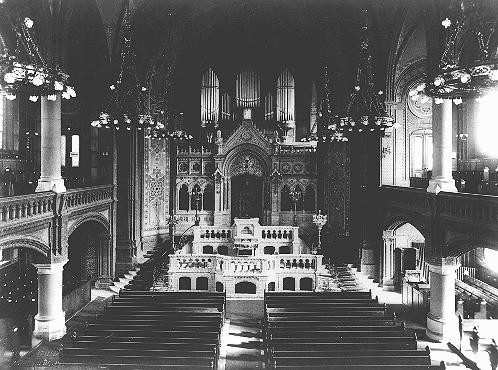
An interior view of the Sephardic synagogue on Luetzowstrasse. Berlin, Germany, before November 1938.
Bildarchiv Abraham Pisarek
Facing Persecution: The Balkans and Beyond
As Nazi forces swept through Europe, Sephardic Jews faced persecution under various regimes, from direct German occupation to collaborationist governments. In Greece, the Jewish community of Salonika, once thriving, was devastated by the Holocaust, with nearly 50,000 Jews deported to concentration camps. In Yugoslavia, Jews faced brutal treatment under Axis occupation, with many perishing in camps or through mass executions.
Remembering Sephardic Victims
While the Holocaust’s impact on Ashkenazi Jews is well-documented, the suffering of Sephardic Jews often remains overlooked. Understanding their unique experiences during this dark period is essential for preserving their memory and ensuring their stories are not forgotten.
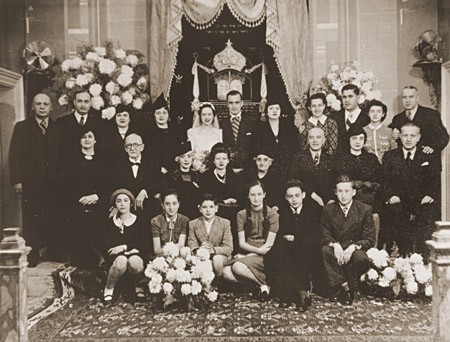
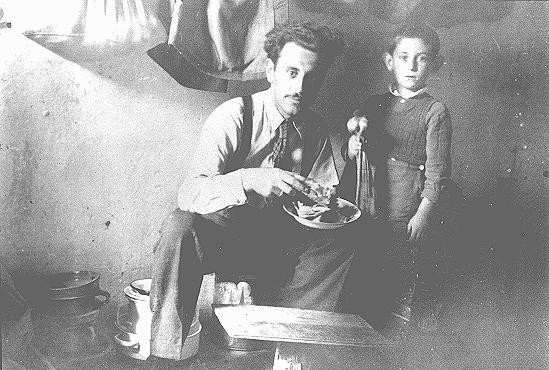
In this article, we delve into the Sephardic experience during the Holocaust, exploring the challenges they faced and the resilience they demonstrated in the face of adversity. Through their stories, we honor their legacy and reaffirm our commitment to never forget the atrocities of the past.
Fate of Sephardic Jews in the Balkans During the Holocaust
The Sephardic Jews in the Balkans faced a harrowing fate during the Holocaust, as Nazi forces and their collaborators implemented systematic persecution and genocide across the region.
Greece: Salonika’s Tragic Demise
In Greece, the vibrant Sephardic community of Salonika, also known as Thessaloniki, suffered one of the most tragic fates. Once considered the “Jerusalem of the Balkans” due to its significant Jewish population, Salonika saw its Jewish inhabitants subjected to discriminatory laws, forced labor, and ultimately mass deportations to concentration camps. The infamous “Freedom Square” became a site of anguish as thousands of Jews were rounded up for deportation. By August 1943, the vast majority of Salonika’s Jewish population had been deported to Auschwitz-Birkenau, where they perished in gas chambers.
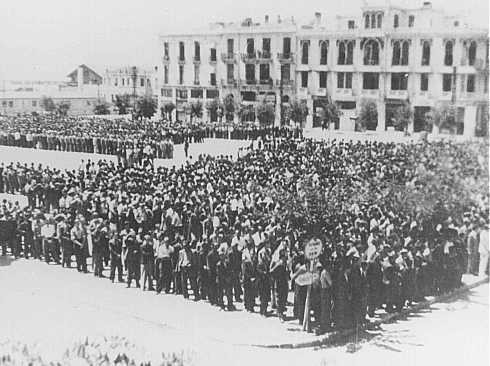
Some 7,000 Jewish men ordered to register for forced labor assemble in Liberty Square in German-occupied Salonika. Salonika, Greece, July 1942.
US Holocaust Memorial Museum
Yugoslavia: Varied Experiences Across Regions
Yugoslavia’s Sephardic Jews faced diverse experiences depending on the regions they inhabited. In Serbia, under direct German occupation, Jews were subjected to severe persecution, including forced labor and mass executions. In Croatia, ruled by a German-backed fascist regime, Jews endured brutal pogroms and were rounded up into concentration camps, where they faced torture and extermination alongside Serbs and Roma.
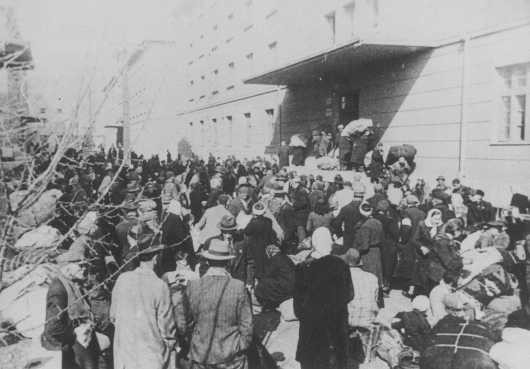
The Jews of Bulgarian-occupied Thrace and Macedonia were deported in March 1943. On March 11, 1943, over 7,000 Macedonian Jews from Skopje, Bitola, and Stip were rounded up and assembled at the Tobacco Monopoly in Skopje, whose several buildings had been hastily converted into a transit camp. The Macedonian Jews were kept there between eleven and eighteen days, before being deported by train in three transports between March 22 and 29, to Treblinka. Image credit: United States Holocaust Memorial Museum
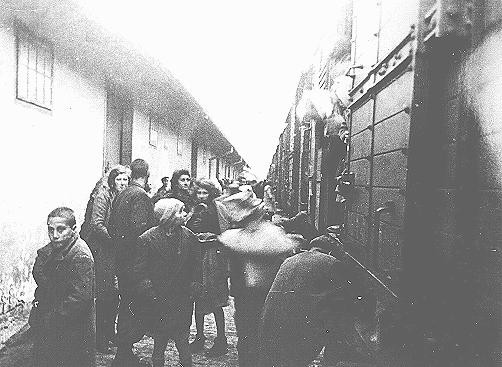
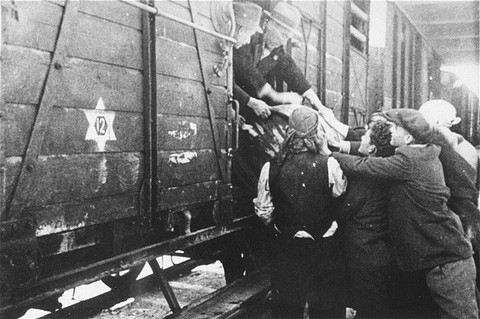
Bulgaria: Mixed Fortunes and Complicity
In Bulgaria, the Jewish population, including Sephardic communities in Sofia and Macedonia, faced a complex situation during World War II. Initially, anti-Jewish legislation was enacted, but due to internal pressure, mass deportations from Bulgarian territories were prevented. However, in Macedonia, collaboration with the Germans led to the deportation and murder of thousands of Sephardic Jews in death camps. This nuanced account reflects the varied experiences of Sephardic Jews across different regions during the Holocaust.
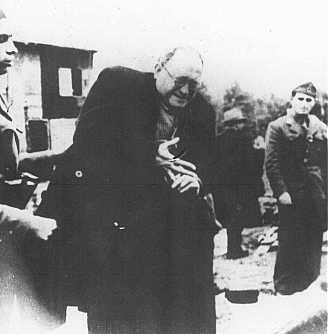
Ustasa (Croatian fascist) camp guards order a Jewish man to remove his ring before being shot. Jasenovac concentration camp, Yugoslavia, between 1941 and 1945.
Jewish Historical Museum, Belgrade
Overall Impact and Legacy
The Holocaust decimated Sephardic Jewish communities in the Balkans, leaving behind a legacy of loss and destruction that continues to reverberate. Entire communities were annihilated, cultural heritage was erased, and survivors faced immense trauma and displacement. Understanding the specific challenges faced by Sephardic Jews in the Balkans during the Holocaust is essential for preserving their memory and honoring their resilience in the face of unimaginable horror.
Sephardic Jews in North Africa During the Holocaust
While much attention is often given to the Holocaust in Europe, the plight of Sephardic Jews in North Africa during World War II is a lesser-known aspect of history.
Morocco: Impact of Vichy Collaboration
In Morocco, under French and Spanish protectorates during World War II, Sephardic Jews faced the impact of anti-Semitic laws and policies enforced by the Vichy regime in France. Discrimination, forced labor, and property confiscation were experienced by Jewish individuals and families, albeit to varying degrees across different regions. While internment did occur, the extent and conditions of such camps varied. It’s essential to accurately depict the nuanced political landscape of North Africa during this period to provide a complete understanding of Sephardic Jewish experiences.
Algeria, Tunisia, and Libya: Varying Experiences of Persecution
During World War II, Sephardic Jews faced different forms of persecution in Algeria, Tunisia, and Libya. While Libya experienced direct Italian fascist rule, Algeria and Tunisia, under French protectorates, implemented anti-Semitic policies.
Egypt: Influence of British Control
In Egypt, where a sizable Sephardic Jewish community resided, the British-controlled government enacted policies to protect Jewish residents from persecution. Despite this, Jewish individuals still faced discrimination and hostility from nationalist movements influenced by anti-Semitic ideologies.
Resistance and Survival
Despite the immense challenges they faced, many Sephardic Jews in North Africa demonstrated resilience and resourcefulness in the face of persecution. Some went into hiding, while others joined underground resistance movements or sought refuge in Allied-controlled territories. The stories of survival and resistance among Sephardic Jews in North Africa underscore the strength and courage of individuals amidst adversity.
Legacy and Remembrance
The Holocaust had a profound impact on Sephardic Jewish communities in North Africa, leading to loss, displacement, and the destruction of centuries-old traditions. Preserving the memory of their experiences during this dark period is essential for honoring the resilience of those who suffered and ensuring that their stories are not forgotten. Through education and remembrance, we honor the legacy of Sephardic Jews in North Africa and reaffirm our commitment to never forget the atrocities of the past.
Other Regions and Communities: Sephardic Jews Beyond the Balkans and North Africa
While the Balkans and North Africa were significant regions with Sephardic Jewish populations during the Holocaust, Sephardic communities also existed in other parts of Europe, each with their own unique experiences.
Brief Overview
Sephardic Jews formed distinct communities in countries like France, Italy, and other European nations, contributing to the rich tapestry of Jewish life across the continent. These communities preserved their unique cultural traditions and religious practices, despite facing challenges associated with assimilation and discrimination.

Pictured in the back row from left to right: Chaim Finci, Tilda (Finci) Mosafia, and Albert Kabilio.
Pictured in the front row from left to right: Rahel Finci, Ella (Kabilio) Finci with her sons, Shmuel and Avraham, in her hands, and Avram Finci.
Photo Credit: United States Holocaust Memorial Museum, courtesy of Shmuel Finci
Experiences under Nazi Occupation
Sephardic Jews in France, particularly those in Marseille and other southern cities, faced persecution under the collaborationist Vichy regime and Nazi authorities. Many were subjected to arrest, deportation, and internment in transit camps before being transported to concentration camps in Eastern Europe. In Italy, Sephardic Jews faced similar persecution under Mussolini’s fascist regime, with the situation worsening following the German occupation in 1943. Other European countries, such as Greece and the Netherlands, also witnessed the suffering of Sephardic Jews under Nazi occupation and collaborationist regimes.

Photo Credit: United States Holocaust Memorial Museum, courtesy of Meryl Menashe
Conclusion: Honoring the Legacy of Sephardic Jews in the Holocaust
The Sephardic experience during the Holocaust offers a unique perspective on the atrocities of World War II, highlighting the diversity and resilience of Jewish communities across Europe and North Africa. As we reflect on their journey through persecution, resilience, and survival, it is imperative that we honor their legacy and ensure that their stories are never forgotten.
Remembering the Past, Shaping the Future
The Holocaust remains one of the darkest chapters in human history, serving as a stark reminder of the consequences of intolerance and hatred. By studying the experiences of Sephardic Jews during this period, we gain valuable insights into the complexities of identity, resistance, and resilience. Their stories challenge us to confront prejudice and discrimination in all its forms and strive for a more just and inclusive world.

Photo Credit: United States Holocaust Memorial Museum, courtesy of Danielle Cassorla
Call to Action
As we commemorate the memory of Sephardic Jews in the Holocaust, let us also commit ourselves to action. By supporting educational initiatives, memorialization efforts, and research projects focused on Sephardic Jewish history, we can ensure that their stories are preserved for future generations. Additionally, advocating for tolerance, understanding, and empathy in our communities can help prevent the recurrence of similar atrocities in the future.
Reflection and Resilience
In honoring the legacy of Sephardic Jews, we celebrate their resilience and courage in the face of unimaginable adversity. Their stories remind us of the power of the human spirit to endure, resist, and rebuild. As we reflect on their journey, let us draw inspiration from their resilience and commitment to preserving their identity and heritage.
Building a Better Future
Ultimately, the legacy of Sephardic Jews in the Holocaust calls upon us to build a better future. By promoting tolerance, understanding, and empathy, we can create a world where diversity is celebrated, and all individuals are treated with dignity and respect. Together, let us strive to honor the memory of those who perished and ensure that their stories continue to inspire us to create a world free from hatred and bigotry.
In remembering the Sephardic Jews who suffered and perished during the Holocaust, we reaffirm our commitment to never forget and our determination to build a brighter future for generations to come.

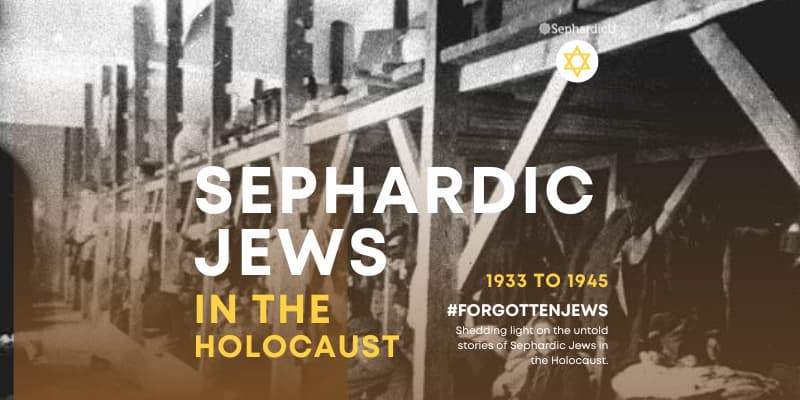






Ohr HaChaim Yomi – Emor